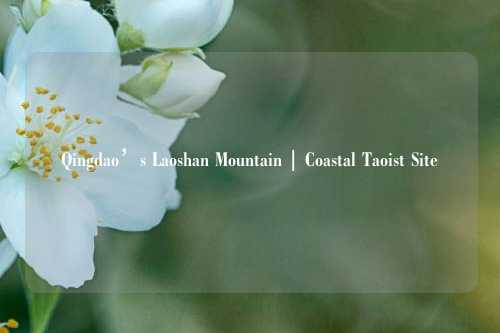Qingdao’s Laoshan Mountain | Coastal Taoist Site
Exploring the Majestic Laoshan Mountain
Laoshan Mountain, located along the eastern coastline of Qingdao, is a place where natural beauty, spirituality, and history come together. As one of the most important Taoist mountains in China, Laoshan attracts pilgrims, hikers, and nature enthusiasts from around the world. Standing at an elevation of over 1,000 meters above sea level, the mountain provides not only a rich cultural experience but also offers some of the most stunning views along China’s coastline. Its unique blend of towering peaks, serene temples, and lush forests make it a must-visit destination for anyone in Qingdao.
Rich Taoist Heritage of Laoshan Mountain
Laoshan Mountain is deeply intertwined with Taoist history and culture, with its roots tracing back to the Eastern Han Dynasty. The mountain is considered one of the birthplaces of Taoism, a religion that emphasizes harmony with nature and the search for spiritual balance. This spiritual significance makes Laoshan a popular pilgrimage site for those following the Taoist faith. As you walk through the mountain, you will encounter ancient temples, shrines, and altars that have stood for centuries, offering visitors a glimpse into the spiritual practices and beliefs of Taoism. These sacred sites are not only architectural marvels but also provide a peaceful atmosphere for contemplation and reflection.

Scenic Beauty and Majestic Peaks
The beauty of Laoshan Mountain lies not just in its historical and spiritual significance but also in its breathtaking natural scenery. The mountain is a dramatic landscape of craggy peaks, deep valleys, and lush forests. The famous Laoshan Peak, which reaches an elevation of over 1,000 meters, offers an incredible panoramic view of the surrounding area. From here, visitors can see the vast stretches of the Yellow Sea in the distance, creating a picturesque blend of mountains and ocean that is unlike anywhere else in China. The area is also home to numerous waterfalls, rivers, and springs, all adding to the natural allure of the mountain.
The flora and fauna found on Laoshan Mountain further enhance its appeal. The mountain is covered in dense forests of pine and other indigenous trees, creating a lush environment that attracts a variety of wildlife. Birds, deer, and other animals inhabit the mountain, making it a great location for wildlife spotting. The verdant surroundings, combined with the high-altitude views, offer a sense of peace and tranquility that makes Laoshan Mountain the perfect retreat from the hustle and bustle of city life.
Exploring the Taoist Temples of Laoshan Mountain
Laoshan Mountain is home to numerous Taoist temples, each offering its own unique charm and significance. These temples are integral to the mountain’s spiritual atmosphere, and visiting them provides deeper insight into Taoist philosophy and practices. Among the most famous temples on Laoshan are the Taiqing Palace, the Zhanlu Palace, and the Yuhuang Temple.
Taiqing Palace, one of the largest Taoist temples in China, is a grand complex located near the foot of the mountain. It was established during the Tang Dynasty and is dedicated to the Taoist gods. The palace features impressive architecture, with traditional Taoist motifs, large courtyards, and beautiful gardens. Visitors can admire the intricate carvings on the buildings, explore the ancient halls, and participate in quiet meditation. Taiqing Palace is not only a place of worship but also an important cultural landmark in the region.
Zhanlu Palace, located at a higher elevation on the mountain, is another key Taoist site that has played a significant role in the development of Taoism. The temple is dedicated to the Taoist immortal, the Lord of the Dao. The structure of Zhanlu Palace reflects the simplicity and natural beauty of Taoist architecture, blending seamlessly into the mountain landscape. From here, visitors can enjoy an even more spectacular view of the surrounding peaks and the distant sea.
Yuhuang Temple, situated near the top of the mountain, is dedicated to the Jade Emperor, a revered figure in Taoism. The temple is small but beautiful, and its location makes it a peaceful retreat for meditation and prayer. The temple offers panoramic views of the mountain, providing visitors with the opportunity to connect with nature and Taoist teachings in a tranquil setting.
Trekking Through Laoshan Mountain
Trekking is one of the most popular activities on Laoshan Mountain. Whether you're an experienced hiker or simply looking for a scenic walk, the mountain offers a wide range of trails suitable for all levels of ability. The paths are well-marked and lead through diverse landscapes, from shaded forests to rocky ridges. Each route provides a different perspective of the mountain, with views that reveal hidden temples, cascading waterfalls, and sweeping vistas.
One of the most well-known hiking routes is the path to Laoshan Peak, which involves a steep ascent but rewards trekkers with panoramic views of both the mountain and the sea. The trail takes visitors through lush forests and past ancient Taoist shrines, offering a sense of history and serenity as you make your way to the summit. The trek is challenging, but the breathtaking views and the chance to experience the mountain's natural beauty make it well worth the effort.
For those who prefer a less strenuous walk, there are plenty of shorter trails that still offer incredible views of the mountain and its surroundings. The peaceful environment and clear air make hiking on Laoshan a rejuvenating experience, whether you're seeking adventure or simply a quiet place to relax and reconnect with nature.
The Healing Springs and Hot Springs of Laoshan
Laoshan Mountain is not only a spiritual and natural haven but also a place of physical rejuvenation. The mountain is home to several natural springs, believed to possess healing properties. These springs have been revered for centuries, and visitors come to bathe in the mineral-rich waters to improve their health and well-being. The area’s most famous spring, the Yujing Spring, is known for its clear, fresh water that flows year-round. Many visitors stop by the spring to drink the water, which is said to have rejuvenating effects.
In addition to the natural springs, Laoshan is also home to several hot springs. The hot springs are located in the lower regions of the mountain and are a popular destination for relaxation. After a long hike or pilgrimage, visitors can unwind in the hot springs, which are known for their therapeutic qualities. The soothing warmth of the water, combined with the surrounding natural beauty, makes Laoshan’s hot springs an ideal place to recharge and relax.
Taoist Festivals and Local Customs
Throughout the year, Laoshan Mountain hosts several Taoist festivals that celebrate the region’s spiritual heritage. The most important festival is the Qingming Festival, a Taoist holiday that honors ancestors and pays respect to the spirits of the mountain. During this festival, locals and pilgrims from across China gather on Laoshan to perform rituals, offer prayers, and celebrate their connection to the divine. Visitors to the mountain during this time can witness traditional Taoist ceremonies and experience the deep cultural roots of the area.
In addition to Taoist festivals, Laoshan is home to several local customs and traditions that have been passed down through generations. Local artisans produce intricate handicrafts, such as silk embroideries and wood carvings, that reflect the Taoist culture of the region. These crafts can be found in markets near the temples and provide a great way to take home a piece of Laoshan's spiritual heritage.
How to Get to Laoshan Mountain
Reaching Laoshan Mountain from Qingdao is relatively simple, as the mountain is located just a short drive from the city center. There are public buses and taxis that regularly make the trip to Laoshan, making it easily accessible for both tourists and locals. For those who prefer a more adventurous approach, cycling to Laoshan from Qingdao is also a popular option. The journey takes you through picturesque countryside and small villages, giving you a chance to experience the landscape before reaching the mountain.
For those arriving from further afield, Qingdao has an international airport with direct flights to major cities in China. Once in Qingdao, visitors can take a bus or taxi to the mountain. The area around Laoshan is also well-equipped with accommodations ranging from luxury resorts to simpler guesthouses, making it an easy and comfortable destination to visit.
A Place of Peace, Beauty, and Spirituality
Laoshan Mountain offers a unique opportunity to explore the natural wonders, rich history, and deep spirituality of China. Whether you're seeking adventure, cultural immersion, or a peaceful retreat, Laoshan has something for everyone. Its towering peaks, serene temples, and tranquil environment create the perfect setting for reflection and exploration. From hiking along scenic trails to immersing yourself in the teachings of Taoism, Laoshan Mountain is a destination that will leave a lasting impression on all who visit.
















